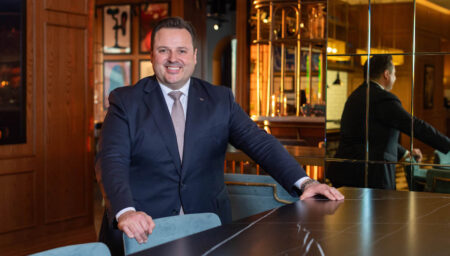A dynamic and challenging night in the theatre
Presented by: State Opera South Australia
Reviewed: 7 September, 2023
When you think of Verdi you usually have a favourite opera and you can remember the glitz, glamour and themes that usually include love and its consequences. It has a human element that tugs somewhere at your heartstrings – and then there’s Macbeth. This is a dark, sinister opera that follows Shakespeare’s narrative very closely and builds from a prophesy to the ultimate demise of a man corrupted by power and driven on by the woman who becomes the victim of her own need for power.
It doesn’t take just good singers – this opera needs good actors, and Stuart Maunder’s current production has a bunch of them on stage. The stage is open to the house and consists of a dramatic black raked stage with floor to ceiling black pillars lit through a haze of smoke by striations of light that give a sense of foreboding doom before the work commences.
From the moment the conductor, Finnegan Downie Dear, lifts his baton the Adelaide Symphony Orchestra adds another actor to the piece. The level and integrity of the score drive the opera in different directions with such ease; the conversations it creates with the singers are magical.
As I said, the opera follows Shakespeare’s narrative very closely and we are introduced to Macbeth and Banquo at the beginning of the piece as they, fresh from battle in Shakespeare’s text, encounter the witches. I sensed there had not been much importance put on the warrior in both the men as the opening lacked the drive, energy and sheer adrenalin rush that would have driven two men fresh from the victory of battle into the clutches of a coven of witches who prophesied such great things for them. As Macbeth, Jose Carbó didn’t hit his straps on opening night until Act 2 when the character began to come alive with some physical and vocal energy, and his intonation in some of the work was questionable. It’s a big sing and one always has to take into consideration the vocal and physical health of the singer. I sensed Mr Carbó was not on the top of his game on opening night. Pelham Andrews, in spite of his impressive demeanour, seemed to have to work hard to spark up. His energy rose to meet the challenge as the opera progressed. He is a fine singer and a fine actor who found the heart of the character with what ended up a fine performance.
Thomas Dalton sang a strong and believable Malcolm, Nicholas Todorovic was also a strong and able presence as both Duncan and the doctor. Teresa LaRocca brought sensitivity and truth to her role as the Nurse. But the evening really belonged to Paul O’Neill and Kate Ladner.
O’Neill has an impressive vocal dynamic, he’s a tenor who can act, which is always a real bonus. His second act aria was one of the highlights of the opera and the reaction from the audience made it clear he was hitting his straps.
Adelaide has produced some impressive singers and Kate Ladner is one of them. Verdi wrote that Lady Macbeth was a role that should not be sung. He said that the role of Lady Macbeth required a soprano whose voice did not possess traditional beauty; he preferred a voice that was “rough, hollow and stifled,” and insisted that “every word has a meaning, and that it is absolutely essential to express that meaning both with the voice and in the acting.” I think Ms Ladner has studied the context of Verdi’s requirement to the letter as far as the acting is concerned. The voice, on the other hand, is glorious, flexible, dynamic and brimming with emotional and vocal integrity.
The State Opera Chorus are one of the reasons this extraordinarily difficult piece of Verdi comes to life. The 18 women and 18 men can sing Verdi! And that’s a big sing. The witches are alive with menace and the black shadowy figures appear, disappear, become what looks like moving shape shifting beings all the while embodying the music that shifts and changes at the drop of a baton. They are very impressive. They also become ladies at the court of Macbeth, villagers, and all with lightning quick changes that make it look like there’s a cast of thousands. Ditto the male chorus. Soldiers, courtiers, villagers, murderers – it’s a night of a thousand characters for the men too and they carry it out with ease and splendid vocal integrity.
Trudy Dalgleish’s lighting was inspired and at times breathtaking. Roger Kirk’s set design was epic and his costume designs were clever and in context with the characters.
Maunder, as always, gets the best out of his cast… and this was another piece of outstanding opera.
I sensed that the audience was a little at sea for a large part of the evening; this is an opera that requires your attention to follow the narrative and if you miss a bit of the plot you get thrown off your game. There isn’t a lyrical tune to get you involved; it is an opera full of challenge, surprises, and runs the gamut from a wall of sound that drives you back into your seat to a pianissimo line or two that demand you change your focus at the drop of a hat. It can be a big ask if you’re expecting something akin to La Traviata.
Reviewed by Adrian Barnes
Photo credit: Tyr Liang
Venue: Her Majesty’s Theatre
Season: 07 Sep – 16 Sep 2023
Duration: 2h 40m (including interval)
Tickets:
Premium: $185
A Reserve: Adult $145, Concession $130.50
B Reserve: Adult $115, Concession $103.50
C Reserve: Adult $75, Concession $67.50
Bookings: https://stateopera.com.au/productions/macbeth-2023/
PG13 – Mild depictions of blood and gore






















